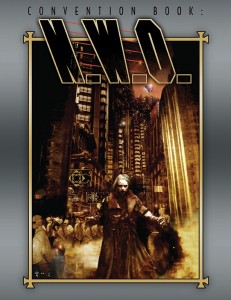 This week Control requests all units file in for Processing, as transcribed in the opening pages of Convention Book: N.W.O.:
This week Control requests all units file in for Processing, as transcribed in the opening pages of Convention Book: N.W.O.:
Day 1 – Installation #417
As the soldiers lead him to his fate, Frank Burlingame’s first thought is that the Technocracy needs to stop embracing tired science fiction clichés.
They have him bound and immobile, yet somehow floating with them through corridors of chrome, soft blue light emanating from the spaces between panels. No windows, no smells in the perfectly sterilized air.
He can’t identify the cause of his paralysis — even his head won’t turn — but his mystical sense has no such restrictions. He feels a void in the ebbs and weaves of the Primal Essence, as though the magic suffusing all Creation were simply, impossibly not present, and he allows himself a smile.
They need a prison made of Primium to contain me. At least they’re affording me the proper respect.
His journey ends in a small, windowless room, with a single chair adorned with tubes and needles. The soldiers place him in it without ceremony and leave. He hears the surge of machinery in motion, feels something pierce him, though there is no accompanying pain.
Am I drugged? Are they in my mind already? How could they, through the Primium?
His breathing picks up with the floating plunge of an adrenaline dump. He closes his eyes, wills the feeling back.
No. They will not witness my fear.
He starts a meditation exercise, the one Eiko taught him—
—and then he remembers how she died, the cauterized bits of her sizzling in the heat of the Brazilian sun.
As if timed to the recollection, a blinding spotlight floods the room. Frank hears footsteps approach, and the outline of a man interrupts the light. He can’t make out the features. Of course, they would arrange things that way.
“Hello,” the figure says. “The quicker you cooperate, the easier this will be.” Something familiar in the voice, but the reverberation in here makes it hard to place. An old enemy? He must have a score of them among the Technocrats’ most elite divisions by now. He imagines a dartboard with his face on it, hanging on a break room wall somewhere. “Seriously?” Frank asks, trying for disaffection, derision. “Christ, you people need a better shtick.”
The figure’s head tilts, and Frank suppresses a grin. Point for me.
“I’m not sure I understand,” the figure says in a flat, bored tone of voice.
“Of course you don’t. That’s the problem with you people. For all your knowledge, you don’t understand a thing.”
The figure folds his arms across his chest, a slight shift of his silhouette in the light. “Perhaps you might educate me.”
“Sure. The ultra-smooth, metallic everything has been done to death. I could name you 10 movies and video games doing the same thing. Doesn’t look imposing or menacing anymore, just that your interior decorator died when Futurism was in vogue.”
Frank pauses now, waits for a response. Nothing. At least this guy learned something in Bad Cop school, whoever he is.
Frank continues. “And this room? The spotlight? This chair? Your threat that’s trying not to sound like a threat? You’re telling me you’re going to torture me. Now I’m prepared. I’m ready to hurt, willing to hurt, and give you nothing. You’ve already failed.”
The figure remains silent for a moment before responding. “Are you willing to die?”
Frank feels his heart rate climb, and controls it with a long, slow breath. “If I must, yes.” Got to find a distraction, throw him off. “But that would piss your handlers off quite a bit, I imagine.”
The jibe doesn’t land. The figure sweeps his hand, as if to wipe away the thought. “Maybe. This can only end one of two ways, so either we’ll know soon, or we’ll never know.” He paces out of view, and Frank can hear his footsteps echoing behind the chair.
Heh. Another tactic straight out of Interrogation 101 — remind the subject of your control whenever you’re stumbling. Frank doesn’t know whether he should be grateful to the Fates or pity the poor fool for his transparency.
“I suppose we should start with the basics,” the figure says, and Frank knows he’s extremely close. A hand latches to the back of the chair. “Tell me who you are.”
What is this?
Frank weighs his answer. “They didn’t tell you when they brought me in?”
“You no longer have the freedom to ask questions here, I’m afraid. Who are you?”
A core of doubt works into Frank’s gut, worms its way through his central nervous system. This isn’t right. The way they assaulted the chantry, they must have had extensive files on its layout, personnel, and defenses. He’d been in their custody before; they don’t send interrogators to do a clerk’s job.
“I’m not buying it,” Frank announces.
“Buying what? I asked you a question, and you are to answer.”
“This is a farce. You already know who I am.”
“I asked you a question, and you are—”
“No. Fuck you. You tell me what you want to know, and we’ll—”
Pain, sudden and consuming, floods every last inch of him that can feel. His limbs. His genitals. Every follicle of hair. The rest of the sentence comes out as an inarticulate cry, the only outward sign of his experience. His unique shackles, whatever they are, make thrashing impossible.
The pain abates as quickly as it started. Frank guesses they must have installed a neural interface, to tell his brain to make him hurt as you might command a well-trained dog. The figure returns to the blinding spotlight, closer now, bearing down on him.
“Frank, I asked you a question. Tell me who you are.”
“You just said my name, you sick fuck, so what—”
More pain. Frank screams, channeling anger into the sound, the only thing he can think of to keep sane.
It stops, leaving a dull ache behind in his muscles. The figure watches him, still as death.
“Tell me who you are, Frank, and we don’t have to do this anymore.”
“I don’t understand,” Frank says, hating himself for how much it comes out sounding like a plea.
“Funny,” the figure says. “Just a bit ago you were accusing me of that. Maybe I can educate you.” He walks into the spotlight’s beam, looking for a moment like an angel on heavenly ascent.
The light shuts off, replaced by lambent panel glow. Frank’s eyes adjust, and he sees that he’s the victim of another cliché. His interrogator is everything he expected — nondescript, medium-height, plain gray business suit, and mirrorshades.
He did not expect to recognize the agent’s face, but he does. “You… I get it now. You planted the bomb.”
The agent nods.
“Damn you, Mason. We made you one of our own.”
The agent smirks. “I’m returning the favor. That’s the least I can do, after all the carnage.” He puts his hands in his pockets. “Now. Tell me who you are.”
Who is Frank Burlingame and what does Agent Mason want? Find out in Convention Book: N.W.O. for Mage: The Ascension Revised Edition, now available in PDF and print from DriveThruRPG.

Comments
3 responses to “Fiction Friday: Convention Book: N.W.O.”
It was after reading this book that I started to understand why they have an entire convention devoted to mind control. I mean, Mind Control is fundamentally incompatible with science, because you want to know the truth, not what someone tells you to find.
Reading this book helped me realize something very important about the Technocracy: They aren’t scientists. The world in which they live in is one where the belief of the masses defines how reality works. Therefore, you can’t actually “discover” how things work, just define it. And the Technocracy is here to define things in such a way that humanity as a whole benefits (and so the Technocracy can continue being the secret masters of humanity, but hey). Without them keeping control of everything, the monsters will get us after all.
It’s a worryingly persuasive argument for mass brainwashing and other Orwellian tactics.
Imagine how it would be to live in a world where many of the rules that govern reality are at the mercy of a bunch of hairless superstitious tribalist apes. Would you really trust society as a whole with such a power? When you take a good look at the world, and how much damage some beliefs do, it’s hard no to sympathize with the technocratic point of view.
The realization that Technocrats aren’t actually scientists is central to their concept, and it’s something that’s incredibly hard to grapple with. The hardest part is realizing most of them don’t even understand that they aren’t scientists. I alwyas loved the Order of Reason book because it put some systematic parameters around what that looks like. Until Enlightenment 4 you buy the propoganda and just believe you are more talented at everything than those around you. When you combine that with M20’s description of paradigm it makes perfect sense, but it’s both elegantly simple and painfully difficult to wrap your mind around.
At Enlightenment 4 you can’t really pretend anymore. While you can’t go wild with your magick the way a mystic who’s been in on the joke since awakening can, you finally start to get what you’re really doing. I wish there was more fiction out there about that trauma that realization could inflict on an enlightened mind. When the absolute truth of your work is central to your paradigm Enlightenment 4 could be very . . . unsettling.